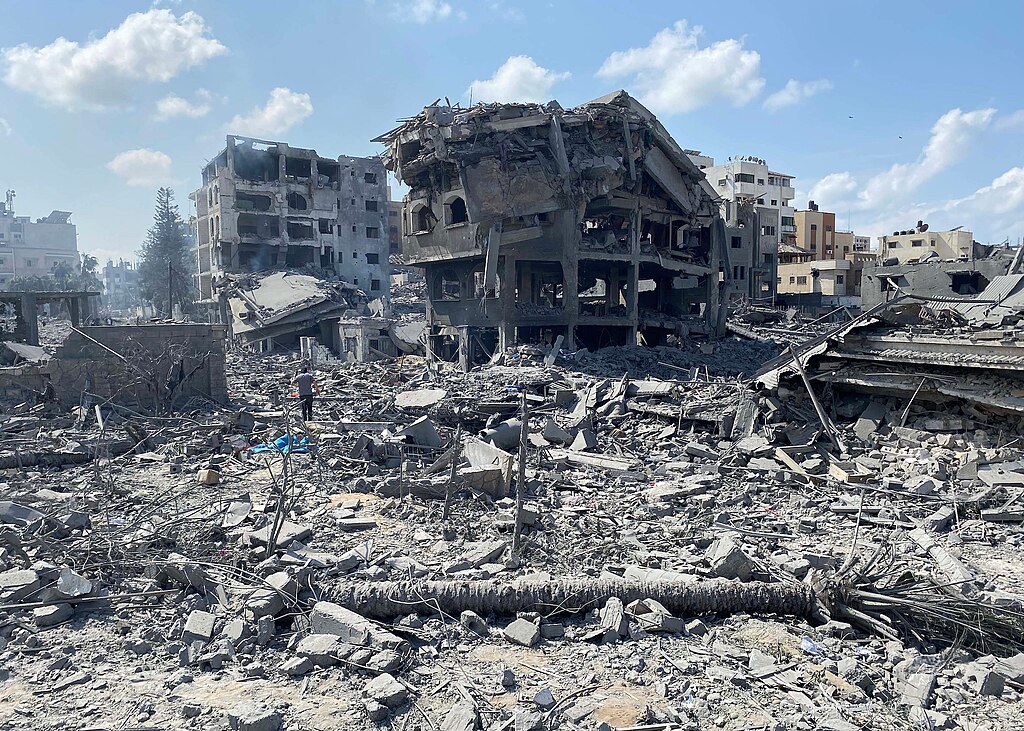Israel Is Starving Gaza Civilians as ‘Method of Warfare’: Human Rights Watch
Original article by JULIA CONLEY republished from Common Dreams under Creative Commons (CC BY-NC-ND 3.0).

“It’s critical to understand this is not simply a byproduct of the conflict, an unfortunate result of a terrible situation,” said one campaigner. “It is Israeli government policy.”
From bombing food production hubs and systematically razing crop fields to halting aid deliveries, Israel is waging a multi-pronged effort to starve the people of Gaza amid the Israel Defense Forces’ bombardment of the enclave, Human Rights Watch said in a report Monday—with evidence drawn from the Israeli government’s own statements as well as survivors’ accounts.
The group demanded that countries such as the United States, United Kingdom, Canada, and others that have provided Israel with military aid and other support since the country began its latest escalation against Gaza in October speak out against the use of starvation as a weapon of warfare—a war crime under the Rome Statute of the International Criminal Court.
“For over two months, Israel has been depriving Gaza’s population of food and water, a policy spurred on or endorsed by high-ranking Israeli officials and reflecting an intent to starve civilians as a method of warfare,” said Omar Shakir, Israel and Palestine director at Human Rights Watch (HRW). “World leaders should be speaking out against this abhorrent war crime, which has devastating effects on Gaza’s population.”
HRW pointed to satellite imagery it has collected in northern Gaza since the IDF began its air and ground assault in retaliation for an attack by Hamas on southern Israel on October 7.
The images have shown orchards, greenhouses, and farmland that have been razed over the last two months, “apparently by Israeli forces, compounding concerns of dire food insecurity.”
Only sand and dirt have been left behind where farmers in northeastern Gaza grew citrus, potatoes, dragon fruit, and prickly pear since Israeli forces took control of the area in mid-November and “systematically razed” the fields, said the group.
Palestinians in Gaza, home to about 2.3 million people, have lost the ability to grow their own food as Israel has refused to allow food, water, and fuel deliveries into the enclave, leaving bakeries and grocery store shelves empty.
Before the Israeli bombardment began, about 500 aid trucks filled with food and other goods entered Gaza on a daily basis to provide sustenance amid Israel’s unlawful occupation and its land, air, and sea blockade that began 16 years ago. Israel has allowed only 100 aid trucks to cross through Egypt’s Rafah crossing since October 7. The U.N. humanitarian coordinator for the Occupied Palestinian Territory, Lynn Hastings, said earlier this month that fuel deliveries—needed for farming, cooking, water desalination, healthcare operations, and other necessities—have been “utterly insufficient.”
Prior to the current escalation, about half of Gaza’s population was facing acute food insecurity and 80% were reliant on humanitarian aid.
The World Food Program (WFP) at the U.N. said earlier this month that 9 in 10 households in northern Gaza and 2 in 3 homes in the south had been without food for at least one full day and night since Israel’s assault. It also warned that 38% of families who had been displaced from their homes in northern Gaza were experiencing “severe levels of hunger” and that the enclave faces a “high risk of famine.”
“It’s critical to understand this is not simply a byproduct of the conflict, an unfortunate result of a terrible situation. It is Israeli government policy,” said Andrew Stroehlein, European media and editorial director for HRW.
In addition to the halting of aid and the destruction of Gaza’s agricultural sector, the last operational wheat mill was bombed on November 15 ensureing “that locally produced flour will be unavailable in Gaza for the foreseeable future,” said HRW.
The group interviewed 11 civilians who described their struggles with finding sufficient food in recent weeks.
A man identified as Taher said that after his family fled south to Gaza City in November, they resorted to eating “just once a day to survive.”
“The city was out of everything, of food and water,” he told HRW. “If you find canned food, the prices were so high… We were running out of money. We decided to just have the necessities, to have less of everything.”
Majed, who left his home in the north after his house was bombed, killing his six-year-old son, said he, his wife, and their four surviving children had no way of making bread for more than a month when they temporarily stayed in Gaza City.
“In those 33 days we didn’t have bread because there was no flour,” he said. “There was no water—we were buying water, sometimes for $10 a cup. It wasn’t always drinkable. Sometimes, [the water we drank] was from the bathroom and sometimes from the sea. The markets around the area were empty. There wasn’t even canned food.”
HRW noted that the Israeli government itself has made numerous statements in recent weeks pointing to the deliberate destruction of Gaza’s food access and the starvation of civilians.
Defense Minister Yoav Gallant infamously called Palestinians in Gaza “human animals” when he announced the “complete siege” and cutting off of aid into the enclave on October 9.
“No electricity, no food, no water, no fuel—everything is closed,” Gallant said.
Col. Yogev Bar-Shesht, deputy head of the Civil Administration, said in an interview that eliminating Palestinians’ ability to grow food is a deliberate tactic.
“Whoever returns here, if they return here after, will find scorched earth,” he said. “No houses, no agriculture, no nothing. They have no future.”
HRW’s report came as the death toll in Gaza hit at least 19,453, with more than 50,800 injured and thousands believed to be buried underneath rubble.
Article 54(1) of the First Additional Protocol to the Geneva Conventions and Article 14 of the Second Additional Protocol both prohibit starvation of civilians as a method of warfare.
“Although Israel is not a party to Protocols I or II, the prohibition is recognized as reflective of customary international humanitarian law in both international and noninternational armed conflicts,” said HRW.
The worsening humanitarian catastrophe, and Israel’s refusal to operate within the bounds of international law, “calls for an urgent and effective response from the international community,” said Shakir.
“The Israeli government is compounding its collective punishment of Palestinian civilians and the blocking of humanitarian aid,” he said, “by its cruel use of starvation as a weapon of war.”
Original article by JULIA CONLEY republished from Common Dreams under Creative Commons (CC BY-NC-ND 3.0).
- ‘A Massive War Crime’: Israel Announces Total Blockade Of Gaza Strip ›
- UN Agency Warns ‘Immediate Possibility Of Starvation’ For People Of Gaza ›
- Oxfam Accuses Israel Of ‘Using Starvation As Weapon Of War’ In Gaza ›
- Gaza’s Food Is Running Out Amid Israel’s ‘War Of Starvation’ | Gaza … ›
- Gaza: Starvation, Disease, And Winter Chill Threaten The Survival Of … ›
- UN Warns Of Gaza Starvation As Concerns Rise About Safety In The … ›
